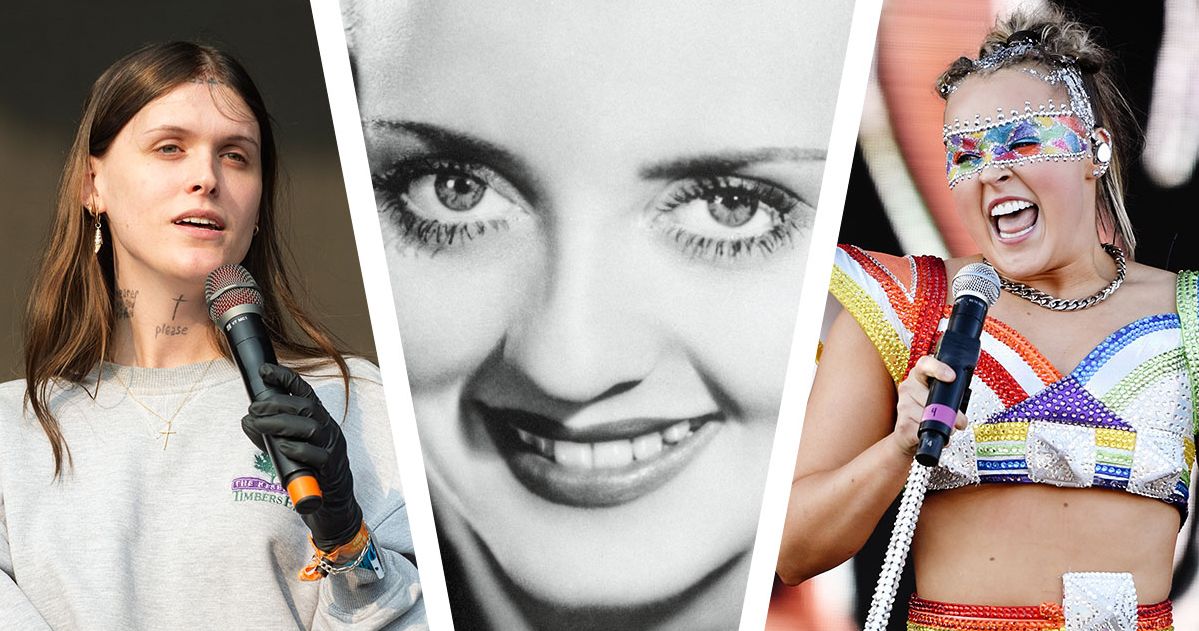Ethel Cain, Bette Davis, and JoJo Siwa.
Photo-Illustration: Vulture; Photos: WireImage (Chelsea Guglielmino, Joseph Okpako), Bettmann/Getty Images
Kim Carnes’s “Bette Davis Eyes,” has become a stone-cold queer classic. Need proof? Look at how both the coolest and the tackiest of modern queer pop stars have reinterpreted it just this month. The 1981 song is told entirely in third person: “She’ll tease you, she’ll unease you / All the better just to please you,” Carnes sings in a raspy, flirty tone, adding that, “She got Greta Garbo’s standoff sighs, she’s got Bette Davis eyes.” The song is written as a warning to men not to date this unnamed subject, but it sounds like Carnes is in love with her. Like on Dolly Parton’s “Jolene” or Paula Abdul’s “Cold Hearted,” Carnes sings about this terrifying woman so passionately that it’s hard not to think they should just cut the bull and kiss.
In the wake of Pride ’25, both professional attention-grabber JoJo Siwa and legitimate genius Ethel Cain have adapted Carnes’s hit (which itself is technically a cover of the Jackie DeShannon original). Right now, both queer identity and intense nostalgia rank among the foremost trends in pop music, so it isn’t surprising to see queer singers dredging up a homoerotic ’80s pop ballad about a bygone movie star. But did anyone think these two would land on the same track? Still, even as they’re working off the same paper, the difference is clear: Cain is bringing the song into the future, while Siwa is rendering it more retrograde than it was in the early ’80s.
Siwa, a Dance Moms alum, made headlines when she began singing the song live, for changing a line of the chorus to be “Chris Hughes eyes,” a reference to her new beau Hughes. The two met while filming Celebrity Big Brother UK and their relationship quickly became a source of controversy, partially because Siwa was dating someone else when they met, and partially because she’d previously defined her identity as lesbian. She teased a full, studio version of the track on her Instagram on June 7, posting a black and white video of her singing a cover of the track while dressed as a ’50s housewife, complete with pearls. On the recording, Siwa is rasping over a dance pop-ified beat, sounding like her previously-clear vocal chords have recently rusted over. Siwa’s never been a “vocalist,” exactly, but at least it usually sounds like she’s using her real voice — here, she’s doing a limp imitation of soulfulness that, even if it was successful, would be at odds with the heartless oontz-oontz of the added beat.
Meanwhile, alt-pop transcendentalist Ethel Cain released her new single “Fuck Me Eyes” on July 2, off of her upcoming album Willoughby Tucker, I’ll Always Love You, and she managed to freshen up the source material. Cain, whose real name is Hayden Anhedönia, is a transgender performer who uses her music to craft the saga of the fictional “Ethel Cain.” The story of her debut album, Preacher’s Daughter, is the tragic romance of Cain and Willoughby Tucker, following Cain as she flees their relationship before being killed (and eaten) by a different lover. Her new album is a prequel, focusing on Willoughby. In line with Carnes’s original, Cain’s new song is a third person tale of a charismatic girl, who Willoughby obsesses over. “She goes to church straight from the clubs / Thеy say she looks just like her momma bеfore the drugs,” Cain croons, adding “All the boys wanna love her when she bats her / Fuck me eyes.” The song is a dreamy pop ballad that crescendos into Cain projecting her insecurities onto the subject: “I’ll never blame her, I kinda hate her / I’ll never be that kind of angel / I’ll never be kind enough to me.”
Despite being the version that’s not a direct cover, it’s Cain’s track that captures the spirit of Carnes’s “Bette Davis Eyes” — they share a dreamy instrumentation and the sense of an unacknowledged queerness on the part of the narrator. When she sings that “I’ll never blame her, I kinda hate her,” Cain turns her track into a worthy sequel, complicating the original emotions of the track even further. Her narrator’s potentially sexual fascination is no longer just subtextually positive: Her hatred and her envy blend together. Cain draws out the fight that is only implicit in Carnes’s original, between the misogynistic “maneater” narrative that she’s singing about, and the longing that Carnes’s voice conveys.
Siwa, meanwhile, bedecked in her trad-wife-ian get up, has made the song mustier. In her public persona, the song represents her newfound relationship with a man, despite her nominally still singing about a woman. Since getting into a relationship with Hughes, she’s said that she previously had “boxed myself in and I said, ‘I’m a lesbian,’” due to “pressure” from the LGBTQ community, but now she is putting herself into a different box, and it’s a very straight-presenting one. In her Stepford-like aesthetic choices, and in her literal insertion of her boyfriend’s name into a song about the relationship between two women, she’s embracing a newly “straight” version of herself, and dragging “Bette Davis Eyes” back in the closet with her.
